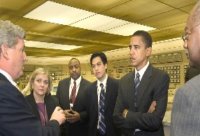The Labour party central council voted overwhelmingly in favor of staying in the government and sharing the decision-making table with Lieberman. Only Minister of Science, Culture and Sport, Ofir Pines-Paz resigned from the government in protest. I strongly admire Ofir’s courageous decision and support his bid to take over the leadership of the Labour party, however I think that the Labour party should not leave the government. The Labour party should begin to implement government decisions on the dismantling of illegal outposts that would force Lieberman to resign from the government. Amir Peretz should immediately meet with Palestinian President Abbas, even if Olmert is against such a meeting. Peretz met with Abbas during his election campaign, then he thought it was the right thing to do, he should do it again now. Why should Lieberman’s entrance to the government force Labour to leave. It is time for Labour to take a leading role in setting the agenda of the government and to stop being the puppy dog of Olmert.
Ofir Pines-Paz has proven to be a politician with integrity. He is one of the few political leaders today who says what he means and acts on it. Once Ofir declared that he would not sit in the government with Lieberman, he had no choice, but to leave the government. In the past years he has been considering his future chances to take over the leadership of the Labour party. He probably is moving ahead with those plans before he would have liked to. Ofir proved his integrity as the Minister of Interior for a short period during the last Sharon government. He did a very good job, given the deep rooted religious and anti-Arab civil service dating back to years of Shas control of the Ministry. He hired an Israeli Arab as Director General of the Ministry, the first time in history. He went forward to tackle planning and land issues in the Arab sector and he worked hard and succeeded in getting additional budgets for deprived communities....
II. Despite its reputation in left-wing circles as an irredemably right-wing organization, the ADL has condemned a leaflet in Ashdod, Israel, against the renting of apartments to Arabs.
Jerusalem, October 30, 2006 … The Anti-Defamation League (ADL) strongly condemned a call signed by Ashdod rabbis forbidding Jews from renting apartments to Arabs or foreign workers. The call was made in a leaflet distributed by the organization Yad l'Achim and signed by well-known rabbis in the city. ADL's Israel office issued the following statement:
We deplore such bigotry in the strongest terms. Such discriminatory appeals are a terrible offense against Jewish teaching and a stain on the name of the Jewish people. Such conduct toward Jews anywhere in the world would not be tolerated and such conduct toward non-Jews must also not be tolerated in the Jewish state.
The call to residents of the city to discriminate against Arabs and foreign workers is not only incompatible with Israeli democratic law and we call upon the authorities to investigate this so-called ultra-Orthodox organization.
This is not the first time that Yad l'Achim has issued racist statements. In the past they have intimidated and harassed members of Jehovah's Witnesses and others....





















